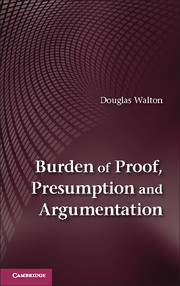Book contents
- Frontmatter
- Dedication
- Contents
- Acknowledgments
- 1 Introduction to Basic Concepts and Methods
- 2 Burdens of Proof in Legal Reasoning
- 3 Presumption in Legal Reasoning
- 4 Shifting the Burden of Proof in Witness Testimony
- 5 Burden of Proof in Dialogue Systems
- 6 Solving the Problems of Burden of Proof
- 7 Burdens of Proof in Different Types of Dialogue
- 8 Conclusions
- Bibliography
- Index
3 - Presumption in Legal Reasoning
Published online by Cambridge University Press: 05 July 2014
- Frontmatter
- Dedication
- Contents
- Acknowledgments
- 1 Introduction to Basic Concepts and Methods
- 2 Burdens of Proof in Legal Reasoning
- 3 Presumption in Legal Reasoning
- 4 Shifting the Burden of Proof in Witness Testimony
- 5 Burden of Proof in Dialogue Systems
- 6 Solving the Problems of Burden of Proof
- 7 Burdens of Proof in Different Types of Dialogue
- 8 Conclusions
- Bibliography
- Index
Summary
The notions of burden of proof and presumption are central to law, but as we noted in Chapter 1, they are also said to be the slipperiest of any of the family of legal terms employed in legal reasoning. However, as shown in Chapter 2, recent studies of burden of proof and presumption (Prakken, Reed and Walton, 2005; Prakken and Sartor, 2006; Gordon, Prakken and Walton, 2007; Prakken and Sartor, 2007) offer formal models that can render them into precise tools useful for legal reasoning. In this chapter, the various theories and formal models are comparatively evaluated with the aim of working out a more comprehensive theory that can integrate the components of the argumentation structure on which they are based. It is shown that the notion of presumption has both a logical component and a dialectical component, and the new theory of presumption developed in the chapter, called the dialogical theory, combines these two components. Thus, the aim of Chapter 3 is to build on the clarification of the notion of burden of proof achieved in Chapter 2, and to move forward to show how presumption is related to burden of proof. By this means, the goal is to achieve a better theory of presumption.
According to Ashford and Risinger (1969) there is no agreement among legal writers on the questions of exactly what a presumption is and how presumptions operate. However, they think that there is some general agreement on at least a minimal account of what a presumption is: “Most are agreed that a presumption is a legal mechanism which, unless sufficient evidence is introduced to render the presumption inoperative, deems one fact to be true when the truth of another fact has been established” (165). According to legal terminology, the fact to be proved is called “the fact presumed,” and the fact to be established before this other fact is to be deemed true is called “the fact proved” (Ashford and Risinger, 1969). The analysis of presumption put forward in this chapter takes this minimal account as its basic structure.
- Type
- Chapter
- Information
- Burden of Proof, Presumption and Argumentation , pp. 85 - 121Publisher: Cambridge University PressPrint publication year: 2014



